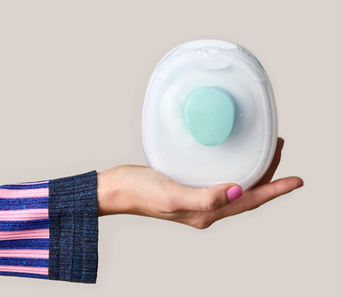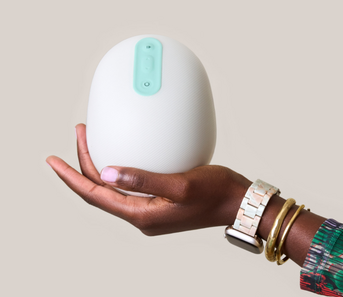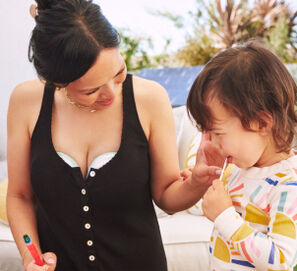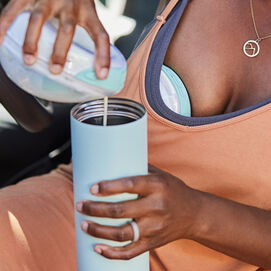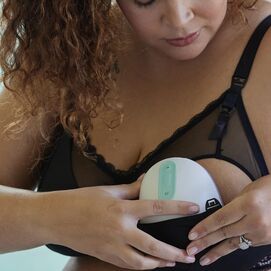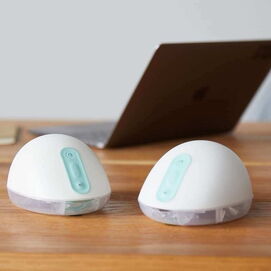Your baby has reached the glorious 3 month old mark, congratulations! Welcome to a period full of baby smiles, sounds, and more lengthy nights of sleep. You may even find some time to relax as your little one settles into a routine. While all babies are different, the 3 month mark can often be one of the most exciting milestones. Keep reading to learn more about 3 month old baby development, and what to expect as your cutie grows.
3 Month Old Baby Development Milestones
Babies grow and develop quickly, we encourage you to take a minute to appreciate the amazing changes they experience! Keep in mind that 3 month developmental milestones don’t always happen on the 3 month mark, and it’s normal for babies to develop at their own unique pace. Below are some of the common milestones that parents can begin to see around 3 months:
-
Emotions: 3 month old babies often begin to smile, laugh out loud, or make responsive faces or sounds to people around them. You can help your baby develop these responses by telling goofy stories or playing games of peek-a-boo. Remember to continue chatting with your baby, even when it feels silly. This will eventually help them to learn how and when to make responsive chatting sounds!
-
Reaching & Grabbing: By the 3 month old mark, your baby may begin learning how to reach for things they would like to hold or touch. They may even grab your hand, toys, or other objects around them. Touching and grabbing new objects allows them to discover auditory cues that are paired with each action.
-
Facial Recognition: Over time, your baby will begin to recognize faces, expressions, and objects. Later on in their development they will be able to distinguish these faces from objects and vice versa. You may notice that your baby will look longer at a new face rather than an old one. This curiosity is your baby’s way of indexing a person’s face, even if they can’t distinguish it as a face quite yet.
-
Head Movement: You may notice that your baby will develop more head control at around 3 months. They will be able to raise their head when lying flat, and they may even be able to support their upper bodies with their arms.
-
Sleep: As your baby develops, you’ll notice that their night sleep schedule may lengthen (lucky for you!). 3 month old babies will continue to sleep on and off during the day, but may sleep up to five hours at night. Because of this, you may notice that they are less fussy at night as they learn to fall asleep when they feel tired.
3 Month Old Baby Breastfeeding
Your breast milk evolves over time to meet your baby’s needs at every stage of development. Pretty cool, right? The more your baby grows, the less often they will need to feed. But you’ll still know when your little one is hungry! Keep an eye out for the signals your little one develops to show that they’re ready to eat.
At the 3 month mark, babies are still only allowed to eat either breast milk or formula. Feeding or pumping sessions are every 3-4 hours, but remember that this depends on your baby’s routine. Focus on feeding around 6-8 times per day to maintain your milk supply. If you notice that your baby’s feeding sessions shorten, this is normal! Babies learn to feed effectively over time. What’s important is that they are getting enough nutrients to continue growing.
You can track the amount of milk your baby is getting by how much weight they gain over time. Along with weight, you can also check their diapers. If their poops and pees are regular, chances are your baby is doing just fine.
How to Help 3 Month Old Development
Watching your baby develop is a magical experience, and you can play a role in it too! Below are our favorite ways to help stimulate your 3 month old baby’s development.
Playing & Exploration
Encourage your baby to safely play and explore with objects they find. As your baby becomes more mobile, you may notice they want to hold and inspect different items. You can also help them explore the world by taking them on little walks and describing all of the exciting things you see as you walk past.
While exploration is crucial for baby development, remember to baby-proof your home first! Keep sharp or dangerous items out of reach for little ones to get their hands on. As they spend some time on their tummy, make sure they have enough padding and room to roll freely. Yoga mats are always a great option for this activity. As always, keep a close eye on your baby as you let them play and explore the world around them.
Music & Singing
You can help stimulate your baby’s intellectual development by playing music, singing songs, and speaking in different tones. In fact, studies show that music can improve a baby’s cognitive skills. Consider singing your baby to sleep, or playing CDs for them during playtime.
Nap Time
Even though your baby will sleep longer at night, they still need those precious naps during the day. Research shows that baby naps are more than beauty sleep. The hemispheres of the brain are actually strengthened while they begin to dream! This is a critical aspect of baby brain development because it helps their brain mature.
Smiling and Talking
Smile and chat with your baby to encourage them to do the same! Babies learn how to make responsive faces and sounds at around 3 months old. Play silly games, walk them through what you're doing in front of them, or ask them questions. The more you are able to engage with them, the more they will learn about language and human interaction.
Stick to a Daily Routine
When babies reach the 3 month mark they are ready to have a routine. This schedule is not strict. Instead, you are adding benchmarks to your baby's daily routine. For example, you may take a walk after each afternoon feeding time, or you may encourage play time in the morning. Remember to do these activities at the same time each day to set a loose routine for your little one.
The 3 month mark is full of excitement and new milestones! To all of our mamas out there, we are so proud of how far you have come, and all of the great hours you are putting into loving your baby. You’ve got this! Need some more tips on breastfeeding, babycare, and everything between? Visit the Willow blog to learn more!


